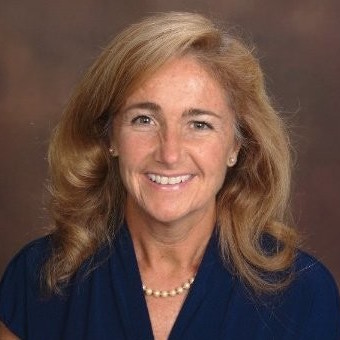
Lynn McConville
September 30, 2914
On this date we featured Lynn McConville, Assistant Principal for Career Technical and Adult Education in the Poway Unified School District.
Lynn’s passion is teaching, and her fundamental belief is that integrated curriculum provides a well-rounded education for students.
“For me, integrated curriculum was a draw 19 years ago when I became a high school classroom teacher,” said Lynn. “This type of curriculum provides relevance and meaning to students, so they don’t need to keep asking ‘why am I learning this and when am I ever going to use this’?”
“It provides students with core academic knowledge and concepts, as well as an avenue to apply that knowledge so they can see how to use what they’re learning in the real world.”
Lynn was drawn to this type of teaching since it provides a more constructivist approach to education. “Most of us generate knowledge and meaning from a combination of experiences and ideas. I loved seeing the light bulb go on for a student when they used their minds and their hands; creating something, solving a problem or teaching someone else. Integrated curriculum allows students to learn transferrable skills such as the value of hard work, providing service to others, thinking critically and the value of teamwork.”
Lynn has a degree in finance and was working as a financial analyst and accountant in Manhattan, prior to becoming a teacher. Though she loved working in finance, she began feeling the need to do something more meaningful. “Children are my priority and I love working with them so I decided to follow my passion and become a teacher.” 2014 marks Lynn’s 19th year in education. She began as a classroom teacher at Scripps Ranch High School, teaching accounting, marketing, graphic design and computer courses. After Scripps Ranch, she spent 6 years as a central office resource teacher, providing professional development and support to Career Technical Education (CTE) teachers. She then moved on to become a Program Manager for CTE and Career Academy Programs in the San Diego Unified School District for 7 years, before landing in her current position of Assistant Principal in the community in which she lives.
Lynn stumbled upon UCCI while working as a Program Manager in charge of CTE curriculum for San Diego Unified. In that role, she was responsible for writing CTE courses for A-G approval. While searching for an appropriate course to round out their Energy and Utilities pathway, she found the UCCI website and started looking at the courses listed on the site. “I thought the courses were brilliant!” she says.
At the time, the district had a course, Introduction to Green Technology and Energy (developed by Mena Abdo), that was similar to the UCCI course Green Up and Go: The Physics of "Clean" Engineering, which integrates physics with engineering. But those teaching Introduction to Green Technology and Energy felt that it was not fully integrating the academic and CTE content in the most authentic way. The Green Up and Go course gave the teachers a model of how that integration could be stronger throughout IIntroduction to Green Technology and Energy,” Lynn explained.
Lynn contacted UCCI to schedule a UCCI Teacher Exchange, so that teachers from schools throughout San Diego USD could work with a teacher who had already been teaching Green Up and Go. At the Exchange, the teachers had the chance to work with David Stafford, a physics teacher who was teaching Green Up and Go at Rosemont High School in Sacramento. They took some elements from Green Up and Go and weaved them into the Introduction to Green Technology and Energy course, in preparation for the course to be taught in six high schools in the San Diego USD. What Lynn loved about this process was the “sharing of ideas, what works and what doesn’t.” She believes that there is a lot of value in teachers sitting together and exchanging ideas and improving on the course, coming up with new instructional approaches and new project ideas.
At the same time, core academic and site administrators in the district were learning about UCCI courses. As Lynn put it, her colleagues in the district were excited about the UCCI courses because of the “meaningful projects and products that come out of these courses.” Lynn said UCCI makes people think a bit differently about how they’re delivering their curriculum.
“These courses are brilliant for both students and teachers,” Lynn notes. "From a teacher perspective, integrated curriculum is more engaging because students are more involved and interested—they start making connections between academic disciplines and how it relates to their future. Projects, connections to industry and authentic assessment (all part of UCCI courses) help students make decisions about what they want to study and what they may want to do to in the future. UCCI curriculum helps teachers move away from the traditional—teach the subject, administer the test and move on to the next unit.” Lynn has the pleasure of seeing students really interested in what they’re learning and see the potential for their future.
Lynn also serves as a member of the UCCI Advisory Council where her input is invaluable to the UCCI team. Once she moved to her current role, she asked her new Executive Director, Kathleen Porter, if she can continue with UCCI and received a resounding “YES.”
“Young people are amazing—they are bright, creative and seek meaning. UCCI courses allow students to explore, engage and apply what they have learned—to prepare them for college, careers and a meaningful future.”
